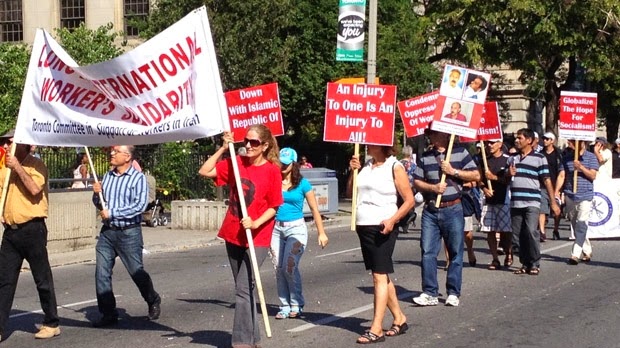http://www.cp24.com
Just what is the state of Labour on this Labour Day? If you were to use Harper government policy a a yardstick, the answer would be "not very good." After all, this is a government which ends strikes before they begin, and which has vastly expanded the Temporary Foreign Workers Program in the wake of the Great Recession.
But even Harper supporter Tasha Kheiriddin acknowledges that the majority of Canadians support unions:
What does the public think about unions? A study conducted in late 2013 by Harris Decima for the Canadian Association of University Teachers found that 56% of Canadians “hold favourable views of unions.” Two-thirds believe that all employees of a unionized workplace should be obliged to join the union, versus giving them the right to opt out via right-to-work legislation. At the same time, 45% thought unions have too much influence over government and business, while 35% disagreed.
And one of organized labour's legacies -- a legacy which the Harperites refuse to acknowledge or do anything to improve -- is pensions. The recent Ontario election underscored the fact that pensions are on the public agenda, if not the Harper agenda.
And Canadians are not just concerned with the state of domestic labour. The recent tragedy at Rana Plaza in Bangladesh -- and the part the Weston Empire played in it -- was not lost on Canadians. Ananya Mukherjee and Darryl Reed write:
Our action as collective consumers and citizens can have an especially transformative impact here. In Canada, the federal government spends millions annually on imported garments, while the government of Ontario also purchases significant amounts, $66 million over the last five years.
While as citizens we pay for these garments, we have little or no information on how or in which countries they are produced. Other public institutions — schools, universities and hospitals — also purchase and sell garments. Our governments and public institutions can adopt purchasing that supports more ethical production. Indeed, some already do. Various universities and municipalities in Canada have “no-sweat” policies for the apparel they buy and sell, and an increasing number have also adopted “fair trade” polices.
These policies can be modified or extended to add best practice clauses that support worker-owned firms and co-operatives. However, none of this would happen without our active input. Changes such as these require that we think and act as members of different collectives, institutions, communities and democracies — and not simply as individual consumers.
The Harperites believe citizens are individual consumers. Labour's vision is a collective vision.It has always stood for the concept of community. And, even after almost a decade of Harperian balderdash, that vision persists.

